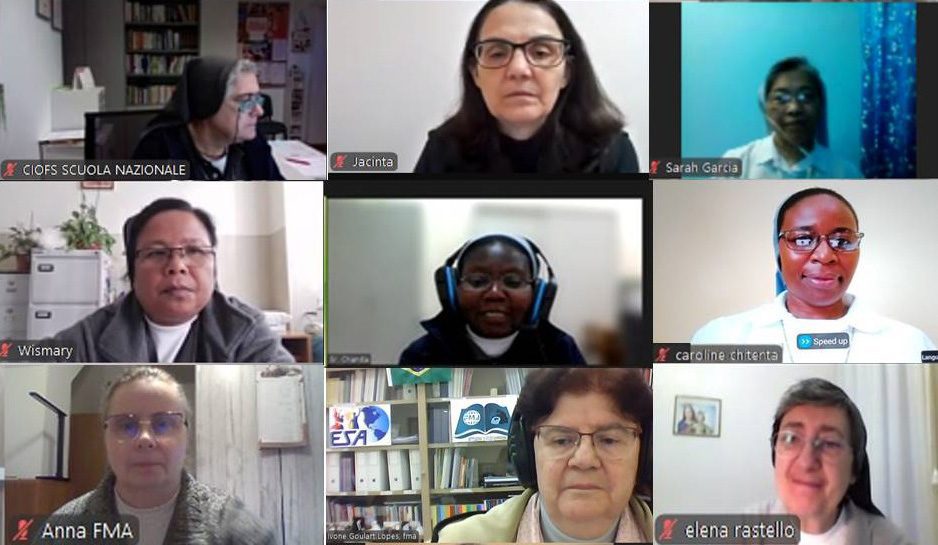Rome (Italy). On 14, 15, and 16 November 2024, the Education Commission of the International Union of Superiors General and the Union of Superiors General (USG), organized the annual Seminar, in online mode, entitled, “Artificial Intelligence, an educative challenge”, to accompany educators and leaders in understanding this complex theme and in facing the challenges.
Together with over 250 participants, representing the Institute of the Daughters of Mary Help of Christians, some FMA who play significant roles in the inter-provincial conferences participated in the Seminar: the collaborators of the Youth Ministry Sector; Sister Sarah Garcia, Director of the Human Rights Office at the International Mary Help of Christians Institute (IIMA) Geneva and CIAO Conference education referent; Sister Chanda Constance Nsofwa, Sector Collaborator and CIAM and CIME Conference education contact; Sister Wismary Kharbihkhiew, PCI Conference contact, India; Sister Ivone Goulart Lopes, Education representative for the Salesian School America (ESA), which includes five conferences: CINAB, CIMAC, CICSAL, CIB, and NAC.
Other participants included: Sister Caroline Chitenta, from South Africa, representing the AFM Province and the CIAM Conference; Sister Lucia Jacinta Finassi, Brazilian, Contact for the Salesian Network of the CIB Conference; Sister Anna Teresa Serafin, of the PLA Province; and Sister Mariella D’Ippolito, of the IRO Inspectorate, representing the CIME Conference; and Sister Elena Rastello, who collaborated in the organization of the UISG-USG commissions.
With the contribution of speakers from different countries, three main themes were addressed during the Seminar:
Luis Aranguren, associate professor of Ethics at the Complutense University of Madrid, in his talk, “A leadership that takes care” spoke of a new paradigm of leadership as an accompanying action and care as a continuous dialogue between discovery and response, that which makes us human.
“At the heart of care is the bond: the bond with teachers, with students, with nature, with families, with diversity. We must seek inclusion.” Prof. Aranguren’s intervention emerged a leadership attentive to the well-being of people and the social impact of its actions, which focuses on relationships, cooperation, and responsibility towards others and the environment.
Likewise, care is understood, not only as action, but as a way of being, an attentive and compassionate gaze that helps to get out of one’s ‘comfort zone’ to face educative challenges with a new vision of the world. The leadership that cares therefore represents a cultural revolution, an invitation to rethink our way of living and working.
Cristóbal Cobo, researcher and expert in Educational Technologies, helped to reflect on Artificial Intelligence in education and new opportunities to personalize the learning experience and make it more engaging through digital technologies. Therefore, it is crucial that educators, who play a crucial role in helping students navigate the complex digital environment, are able to mediate content, helping students to keep their attention alive and enrich their language in order to meet the challenges of the future by integrating cognitive capabilities and the potential offered by digital technologies.
In his intervention, Prof. Cobo addressed the opportunities and threats of AI in education, indicating some useful tools for educators and especially some tasks essential to make the most of this technology’s potential, mitigating its risks.
“How Artificial Intelligence transforms education” is the third theme presented by Prof. Paola Inverardi, Rector of the Italian Scientific Institute Gran Sasso Institute and Prof. Fabio Pasqualetti, Salesian of Don Bosco, Dean of the Faculty of Social Communication Sciences of the Pontifical Salesian University of Rome and Consultant of the Dicastery for Communication of the Holy See, who spoke about the challenges and perspectives to build an ethical digital future.
“We must involve philosophers, sociologists, psychologists, and engineers, raise awareness among users and system producers and make this approach sustainable.” And also: “Digital ethics is a complex but necessary challenge. It is our duty to ensure that technologies are at the service of humanity and not vice versa. Digitizing the human to remain human,” said Prof. Pasqualetti.
The Youth Ministry Sector of the FMA Institute will soon send to all Provinces an information bulletin, ‘PG in Communion’ with summaries of the contents presented at this Seminar.



















